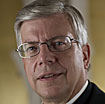There were eight of them; Mexican immigrants, mostly teenagers.
Only one of them could write. They were first in line for the Tuesday morning breakfast program for our homeless neighbors at Saint Peter’s Church in midtown Manhattan.
They were very polite. They took their seats, taking up a whole table, and ate their breakfast — and seconds and thirds — quietly and quickly. They took the lunch bags we prepared and left.
I didn’t get it at first, until the next week when thirty showed up, all together in the front of the line. And then I knew the depth of the economic meltdown.
These kids held jobs at the bottom of New York’s economic pyramid, as take-out food deliverers and construction site “go-fers.” They were the first to be let go. If there was any question in my mind about the depth of the crisis, it disappeared the second time I met these young Mexican immigrants. Its effects had already reached the bottom.
Looking back now, I can see they were not the first sign that the economy was in a downward spiral.
Back in July, there was the Bear Stearns crew, four young men and women who occasionally — and individually — came to our daily noon Eucharist, but were now coming every day as a group. They had been administrative assistants, account managers, and office technicians, but thanks to the failure of the company they were newly unemployed. We talked a lot after the mass. We weren’t very worried. They had weeks of severance pay and unemployment benefits. I thought “Bear’s” failure was a singular event and not a portent of things to come.
But portent it was.
Now we all know that. At Saint Peter’s Church, both our members and our outreach programs attest to the depth of the crisis.
There is a 40% increase in clients at our breakfast program for the homeless, and at our Momentum AIDS program. More seniors, whose savings and retirement funds have significantly diminished, are attending lunch at our senior center.
As of this writing, nine of our members have lost their jobs. One, single and at age 50, is planning on “moving back in with Mom.” Another of the same vintage has been job hunting “back home” in Michigan, where economic opportunities can only be worse. And, of course, stewardship and our endowment investments have each suffered loss. I could go on with example after example in the parish and the city and the synod, but the story would be the same. And it ain’t over yet.
I’ve done a lot more pastoral listening lately. Members of the congregation have dropped in to share their experiences and fears. Members of our Finance Committee have already begun considering “Plan B.” Colleagues in neighboring religious communities speak of draconian program cuts and staff layoffs.
Saint Peter’s is located at the base of the CitiGroup Tower in which 8,000 people work every day. We are no stranger to managing terror here. Many of these have also dropped by to tell their story, get some advice and, significantly, to hear “a word from the Lord.”
At this late date, there’s a lot of listening, but not a lot of advice to give. I missed the signs just like everyone else. We can talk about learning, consuming less, saving more, emergency funds and going “green.” We can plan to help one another: I’m asking those parishioners less affected to contribute to our discretionary funds so we can better serve those more affected. Our Sunday Brunch and Jazz supper both need to prepare to serve more and receive less. But mostly we need to listen to one another and “weep with those who weep.”
As to “a word from the Lord,” it has to be the Gospel. These folks have experienced a full and inescapable dose of the always-accusing, conscience-troubling, life-threatening Law. They get it too; they know that what’s happening to them and to the whole world is judgment. They know they need to hear “a word from the Lord” that is not curse but cure, a word that will motivate them to more faithful and hopeful living.
Jesus’ “apocalyptic” words in the Synoptics have been most helpful. In response to his disciples’ crisis-provoked anxiety, Jesus says “this is but the beginning of the birth pangs” (Mark 13:8b).
In response to the fears that these times are “death throes,” I’ve found it helpful to speak of “birth pangs,” and to point to the One who is and was and is to come. It helps to invite trust, offer Christ in sacramental presence, and encourage self-examination, communality, and hope all rooted in the ageless Promise of God. These days, after subprime mortgages, junk bonds and broken promises, it’s not a very hard sell.

